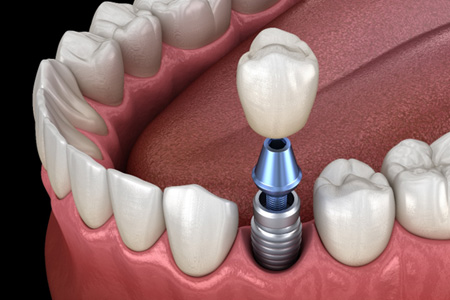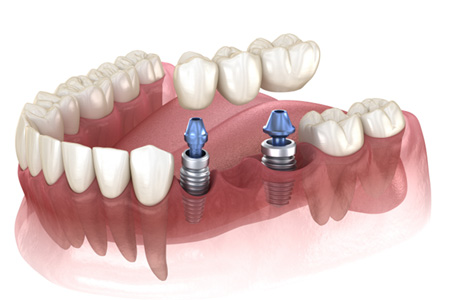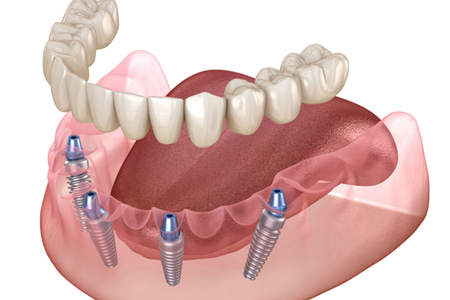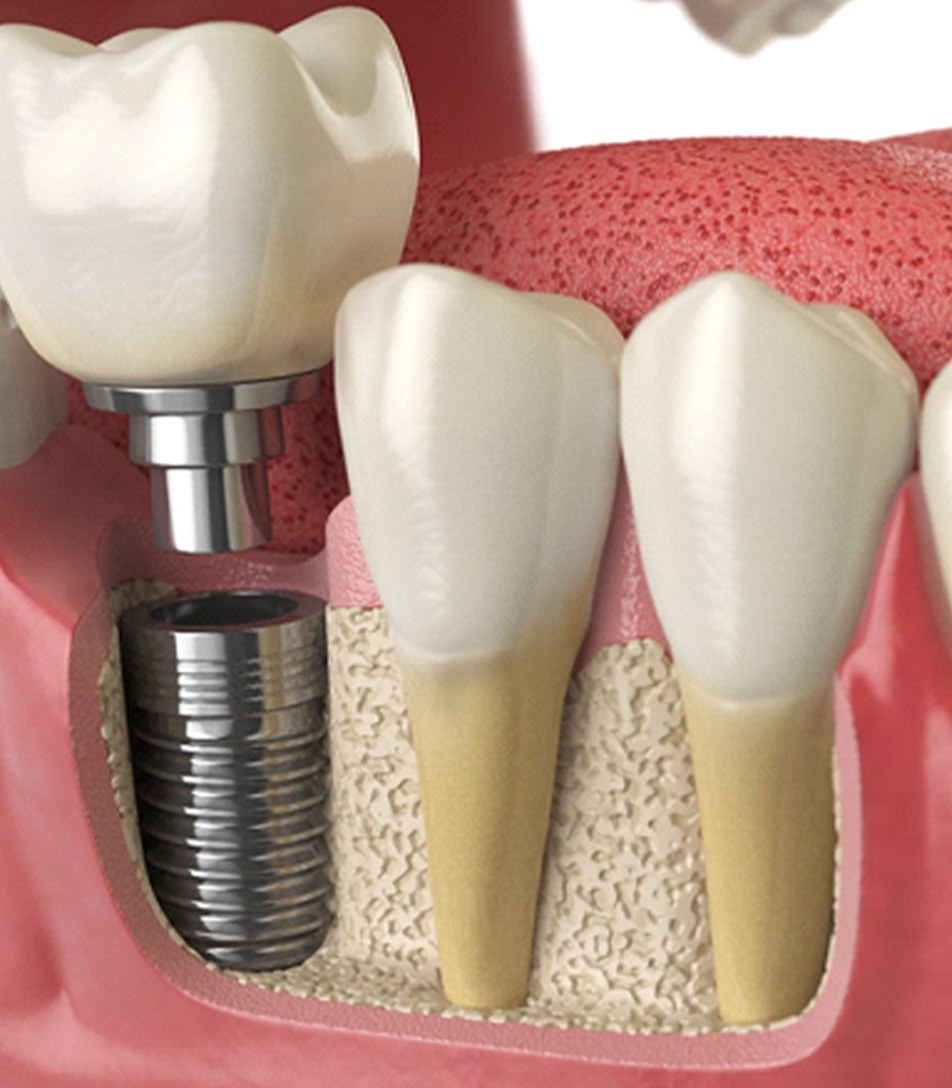Dental Implants – Royal Palm Beach, FL
The Best Way to Fill Gaps in Your Smile
Missing teeth do more than simply inconvenience you when eating, speaking, or smiling. Over time, it can cause your jawbone to deteriorate due to a lack of stimulation from chewing. The good news is that our team at Pearl Palm Beach Dental can help you avoid these issues by filling the gaps in your mouth with small metal posts called dental implants. To learn more about this modern tooth loss solution, continue reading or give our office a call today to schedule a consultation!
Why Choose Pearl Palm Beach Dental for Dental Implants?
- Partnered with Trusted Specialists for the Best Results
- Natural-Looking Restorations
- Multiple Financing Options Available
What Are Dental Implants?

A dental implant is an artificial post that’s surgically inserted into the jawbone to replace the entire structure of a missing tooth, from the root up to the chewing surface. Because of its unique placement, it will naturally bond with the surrounding bone tissue over time, creating a stable foundation for your new teeth. In the end, you’ll have a result that looks and functions very naturally!
The 4-Step Dental Implant Process

Dental implants are the only method of tooth replacement that fully restores missing teeth from the roots up, making the process more extensive than traditional restorations like dentures and bridges. Typically, the entire dental implant treatment process takes several months to a year to complete – a relatively short time for results that can last a lifetime! During your initial examination, our team will provide a more precise timeframe so you know what to expect. To learn more about how dental implants work, here are the four main steps we follow.
Initial Dental Implant Consultation

First things first, our team will need to confirm your eligibility for dental implants. While most healthy individuals with one or more missing teeth qualify, underlying issues such as decay, gum disease, and insufficient jawbone density can affect the success of the procedure. If we identify any other problems, we’ll address and restore your oral health before proceeding. Once your mouth is in good condition, we’ll provide a personalized treatment plan outlining what to expect, including the timeline and overall cost.
Dental Implant Surgery

After Dr. Civetti has determined you’re the right candidate for implants during your consultation, the first step in your treatment will be their surgical placement. You will be referred to a trusted oral surgeon for this procedure! What happens is a titanium post will be inserted into the appropriate empty socket(s) in the jawbone and then allowed breathing room to bond with your natural structure to create a lasting foundation.
Dental Implant Osseointegration & Abutment Placement

Over the next four to six months, the dental implants will fuse with the surrounding jawbone via a natural process called osseointegration. This will help form a stable, natural-feeling foundation for your final restorations. Recovery time can vary for each patient since every case is unique.
Once you have healed, you'll return to our office to have the abutments placed. These connector pieces are necessary before receiving your personalized crown, bridge, partials, or full dentures. Our team will take impressions of the area and craft your restoration while your gum tissue heals over the following weeks.
Delivery of Dental Implant Restorations

Once your final restorations are ready, we’ll invite you back to our office for the last phase of your dental implant treatment. Our team will anchor your replacement tooth or teeth onto the metal posts, ensuring a proper and comfortable fit. We'll take the time to confirm that your bite is balanced, address any questions you might have, and ensure you're satisfied with the results before you leave to show off your new and improved smile.
Benefits of Dental Implants

Today’s dental implants have more perks than dentures or dental bridges. Since they’re placed in your jaw, they can do things other restorations can’t hope to match. That’s led them to become so popular that U.S. dentists place about 500,000 of them yearly! As for the specifics, our practice will gladly share the benefits of dental implants in Royal Palm Beach. Just keep reading to learn about them in detail, or call our office.
Day-to-Day Benefits

Of course, dental implants’ day-to-day benefits are their most apparent ones. These advantages are:
- Lifelike Looks – Thanks to their porcelain surfaces, dental implants match your other teeth in size, color, and shape. Their titanium bases also ensure they stay secure and won’t fall out.
- Higher Confidence – By restoring your smile, dental implants should boost your confidence. You’ll feel less anxious about your looks, speech, eating ability, etc.
- Better Eating – Dental implants restore your bite’s strength when they fuse with your jaw. As a result, they let you eat your favorite tough foods again.
- Easy Maintenance – In essence, you can clean and maintain dental implants like natural teeth. You just need to brush them twice daily and floss between them once daily.
Health Benefits

The health benefits of dental implants are also notable. Over time, they provide perks like:
- A Cleaner Mouth – Untreated smile gaps let bacteria that can cause tooth decay and gum disease spread. Luckily, dental implants fill these spaces and make your mouth healthier.
- Tooth Support – If they’re left alone, smile gaps will slowly tilt your remaining teeth until they fall out. Dental implants prevent that outcome when they’re placed.
- A Stronger Jaw – Tooth loss slowly erodes the jaw, leading to a high risk of facial collapse and similar issues. The good news is that dental implants stop (and reverse) this erosion.
- Good Nutrition – Due to restoring your bite, dental implants expand your dietary choices. This wide range of meal options helps you get the vitamins and minerals you need.
Long-term Benefits

Given the proper care, dental implants have many long-term benefits as well. The most notable of these are the following:
- High Rate of Success – Compared to other restorations, dental implants almost always succeed for long periods. They even have a ten-year success rate of 98%!
- Enduring Effects – Dental implants tend to last a long time once they’re placed. The average implant has a lifespan of 15-20 years, while a well-maintained one can work for 30 years or more!
- Cost-Effective Care – While they may look pricey at first, dental implants are cost-effective in the long term. They rarely need repairs or replacements (unlike dentures or dental bridges), so they don’t involve a lot of expensive follow-up work.
Who Dental Implants Can Help

Dental implants are extremely versatile – it’s no surprise that they’ve become increasingly popular in recent years! If you are considering this state-of-the-art tooth-replacement solution for yourself, then don’t hesitate to schedule a consultation at our Royal Palm Beach office. You can also read on to learn more in the meantime, including the qualities we look for in a good dental implant candidate.
Who Is a Good Candidate for Dental Implants?

At your consultation, Dr. Civetti will review your medical history and conduct an oral examination. Throughout the process, she’ll check the density of your jawbone, assess the health of your gums, and determine your willingness to commit to good dental care habits, like brushing twice a day, every day. With all of this information, she can verify if you’re a good candidate and, if you are, create a custom treatment plan that works best for your situation.
Important note: Even if you don’t meet the criteria for dental implants initially, you can have preliminary work done, such as bone grafting, to ensure successful treatment. So, whether you’ve lost a single tooth or all your teeth, don’t hesitate to schedule a consultation!
Missing One Tooth

A single dental implant can be used to replace one missing tooth. If we determine that this is the best way to rebuild your smile, then we will surgically insert the implant into your jawbone. After your mouth has healed from the surgery, a crown can be placed on top to complete your smile. Since the entire restoration is custom-made to suit your unique face shape, dental needs, and smile goals, the final result will look and feel incredible!
Missing Multiple Teeth

If you’ve lost multiple teeth, you have a few options! The first is replacing each tooth with a single dental implant. The second, which is ideal if you are replacing two or more teeth consecutively, is anchoring a fully customized dental bridge with two dental implants. The third is a partial denture, which we can secure in place with dental implants to ensure the final result is a complete smile and a strong bite.
Missing All Teeth

Have you lost an entire arch? Don’t worry – we can replace them with a full denture! Traditionally, this restoration is held in place with natural suction or denture adhesive. Now, we can use dental implants. Luckily, you don’t need too many implants to support this prosthetic either; four to six implants are usually sufficient to give you the incredible results you desire.
Understanding the Cost of Dental Implants

The cost of dental implants is not the same for everyone. Each case carries its own unique needs. Although many of the same factors are used to determine the cost, no two individuals possess the same situation. This is why a scheduled consultation is essential to determine both candidacy and cost. Our team will work directly with you to establish ways to maximize your dental insurance plan as well as go over available financing options.
Preliminary Treatments & Dental Implant Surgery

Any preliminary procedures that you need before you can get dental implants, like gum disease therapy, tooth extractions, and bone grafting, will contribute to the overall cost. For lots of patients, these treatments are needed to ensure that the dental implant placement procedure is successful. Preliminary treatments are sometimes partially covered by dental insurance, so this is something that you should double-check with your provider.
Implant surgery incurs its own cost depending on where the implants are being placed in the jaw and what kind of sedation or anesthesia you get. We want you to receive the best results possible, so we work with local specialists for your surgery. They will discuss with you separately exactly what you can expect to pay for the surgery.
The Parts of Your Dental Implant

Here are some of the factors that will contribute to the cost of your dental implant:
- Number of dental implants: Depending on the number of teeth that you need to have replaced and where they are located in the mouth, you will need more or fewer implants. The more implants you need, the higher the cost will be.
- Type of restoration: Crowns, bridges, and dentures all have different costs. The smaller the restoration, the lower the cost usually is.
- Size or material: Implants can be made from zirconia or titanium. These materials are at different price points.
- Brand of dental implant: Dental implants come from different manufacturers. This can influence their cost.
How Dental Implants Can Save You Money

It may be tempting for patients to save money by choosing bridges or dentures to replace their missing teeth. However, dental implants have benefits that you can’t get from other tooth replacement options. They can even help you save money in the long run. You won’t need to worry about paying for replacements every 5 to 7 years either like you would for dentures. There’s also no need to stock up on adhesives or soaking solutions. Dental implants can also help you to avoid oral health issues, like gum disease, misalignment, and tooth decay, that will require costly treatments in the future.
Does My Dental Insurance Cover Dental Implants?

A lot of the time, dental insurance plans will not cover the cost of dental implants, but there are a few exceptions. Parts of the final or preliminary treatments are sometimes covered. Our team is happy to work with you to help you understand what is covered in your plan before you begin treatment. This way, we can help you fully maximize your coverage.
Making Dental Implants Affordable

If you don’t have dental insurance, this doesn’t necessarily mean that you are completely out of luck. With our in-house wellness plan, you can save on procedures completed at our office. We also work with CareCredit and Alphaeon Credit, third-party financing companies that can split the cost of your treatment into manageable monthly installments with little to no interest. For more information on your financial options, don’t hesitate to reach out to one of our friendly team members!
Maintaining & Caring for Your Dental Implants

Dental implants can keep a smile complete, healthy, and strong for life if you take excellent care of them. Luckily, these remarkable devices are so similar to real teeth that they only require the same oral hygiene and maintenance methods to stay in great shape. Here’s a brief guide to the best ways to keep your devices beautiful and functional for as long as possible from the team at Pearl Palm Beach Dental.
Make Oral Hygiene a Priority

While dental implants are completely immune to cavities, the gum and jawbone tissues supporting them can still be compromised by destructive oral infections. To prevent this, be sure to brush, floss, and rinse with antibacterial mouthwash every day. Take care to use nonabrasive gel-type toothpastes and avoid pressing too deep into your gums when flossing.
Eat a Healthy Diet

Dental implants allow patients to chew all the foods they could with real teeth, but it’s important to make sure you enjoy plenty of nutritious foods so your gums and bones can receive the protein, vitamins, and minerals they need to stay healthy. Be sure to enjoy items like lean meat, dairy products, and fresh fruits and vegetables while limiting your consumption of sugar and acids.
Break Bad Habits

Poor oral habits can set your dental implants up for early failure. Be sure to refrain from using your teeth to open packages or bottles or to chew on inedible materials like wood, metal, plastic, or ice. It’s also best to abstain from tobacco and drink alcohol only in moderation if at all.
Protect Your Dental Implants

While dental implants are incredibly strong, they are not invincible and can be damaged if exposed to too much force. Be sure to wear an athletic mouthguard when playing sports or riding a bike and a protective nightguard if you grind your teeth at night. We can provide you with a customized nightguard that provides superior protection at our office in Royal Palm Beach.
Schedule Regular Dental Checkups

It’s still crucial to visit us at our Royal Palm Beach office every six months even if you have replaced all your teeth with beautiful and functional dental implants. These visits allow us to monitor the health of your soft tissues and remaining teeth and address problems in their early stages. We’ll also be able to recommend better oral health habits and answer any questions you have about taking care of your smile.
Dental Implant Failure & Salvage

Dental implants are the best tooth replacement option out there. Since they replace the roots of the missing teeth, they offer a wide range of benefits, including an incredible success rate of over 95%. That being said, dental implants can still fail in some situations. If you have concerns regarding your dental implants, contact us right away. The sooner we can examine your smile, the more likely that we can save your replacement tooth.
Learn More About Dental Implant Failure & Salvage
Dental Implant FAQs

Dental implants are one of the most popular methods of tooth replacement, and they’re arguably one of the most sophisticated. While it’s easy to see why they’re so desirable, it can be a little bit harder to completely understand everything there is to know about them.
Dr. Civetti and the rest of the team here at Pearl Palm Beach Dental would love to share our expertise with you at your consultation, but until then, here are answers to some of the questions you may have about dental implants.
Are Dental Implants Safe?
As with any dental procedure, you’ll need a thorough exam to determine whether you’re a good candidate for dental implants. If you have diabetes, cancer, or other conditions that could make the surgery risky, we’ll take that into consideration before recommending surgery. That said, if you’re in fairly good health, dental implants are incredibly safe.
We also partner with experienced specialists who know the potential pitfalls of dental implants and how to avoid them. This minimizes the risk to you, allowing you to rest easy.
How Can I Tell If My Dental Implant Is Failing?
Typically dental implants only fail after decades of wear and tear. If you notice your dental implant is loose, or that the restoration attached to the implant seems like it may come off, this is a sign that it could fail soon, and you should talk to us about a replacement.
You should be vigilant for any signs of severe infection, as this could also cause an implant to fail if nothing is done. If you’re noticing severe pain, inflammation, or swelling on the gums, we’d like to bring you in to check for a serious infection, so call us right away.
How Long Does It Take to Recover from Dental Implant Surgery?
If you’re worried about how long you’ll be out of commission, don’t worry—most people can return to work as soon as the next day after surgery. Any swelling or bleeding should stop completely within the first few days.
However, it’s recommended that you take it easy for a week or so, avoiding any kind of exercise or strenuous activity. If your work involves hard labor, you may want to call out for at least that long.
While you should feel back to normal after a week or two, it’ll take considerably longer for the implant to fuse with the jawbone completely, around six months. Most of this will happen under the surface, meaning it shouldn’t affect you much day to day.
How Soon After a Tooth Extraction Can I Get Dental Implants?
This heavily depends on the patient, and we’d need to have a better idea of your circumstances to give you a straightforward answer. If your jaw is healthy enough after the extraction, you may be able to get your dental implant immediately afterward.
However, we typically recommend waiting 3-6 months for the extraction area to heal. You also shouldn’t wait too long, because if you do, it’s possible the jawbone could shrink due to the lack of a tooth. This makes getting a dental implant at all a bit more challenging.
